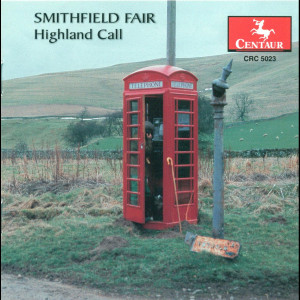 Completely unfamiliar with Smithfield Fair, I had no idea what to expect on Highland Call, apart from the vague notion that this was some type of contemporary Scottish band whose music may or may not have absorbed some of the local flavor from their Baton Rouge, Louisiana, surroundings. Thankfully, that’s not the case here. Instead, Smithfield Fair is a band that has adopted a rustic, rugged sound that eschews glossy adornments or slick production and, for the most part, succeeds admirably. At times, there’s a muffled murkiness to the sound. This is puzzling since the recording is fully digital, but this isn’t a problem that rises to the level of spoiling the album.
Completely unfamiliar with Smithfield Fair, I had no idea what to expect on Highland Call, apart from the vague notion that this was some type of contemporary Scottish band whose music may or may not have absorbed some of the local flavor from their Baton Rouge, Louisiana, surroundings. Thankfully, that’s not the case here. Instead, Smithfield Fair is a band that has adopted a rustic, rugged sound that eschews glossy adornments or slick production and, for the most part, succeeds admirably. At times, there’s a muffled murkiness to the sound. This is puzzling since the recording is fully digital, but this isn’t a problem that rises to the level of spoiling the album.
The album opens with a pleasing, loping rendition of “An Coineachan — A Fairy Lullaby,” Jan Smith’s earthy vocals meshing well with the backing vocals of her male counterparts. The final product is a sound that conjures images of the band, arm-in-arm, swaying along with the music in the studio as they performed, with perhaps a mug of beer or two held aloft in celebration. The spare guitar arrangement works well; anything more would probably have pushed this track too far. A traditional selection, “An Coineachan” stands out among the nine other traditional tunes included here — there are 14 tracks altogether. What’s unusual here is that, unlike most other traditional bands, it’s on the handful of original compositions included here that Smithfield Fair really shines.
On the song “Long Fada” (Longships), a tune penned by Dudley-Brian Smith, there’s an ominous threat prevalent in the repetitive drumbeats and raw, tribal vocals. The music is quite effective at evoking the imagery of longships slicing relentlessly through fog-shrouded, icy waters. This is best illustrated by the fact that I picked up on all the visuals even though I put the disc into my CD player without looking at any of the track titles! The threat of Viking raids is very real for the 4:02 this tune runs … and lingers for quite a while afterward.
Another Dudley-Brian Smith composition that works quite nicely is “The Pretender Will Cam Nae More.” A defiant war anthem in support of King James, the band again goes with a sparse arrangement of guitar, durm and mandolin to highlight the urgent, energetic layered vocals. With lines like “Up the claymore, up the standerd/The pretender will cam nae more/Stand your ground for Hielan’ honour/Nae deliverer frae the tyrant’s force!” the song rings true in all the right ways and could easily be mistaken for an obscure traditional piece. It’s lead-in, though, the brief “Cumha Seamus A’Gleann” (Lament of James of the Glen), sounds pretty much like every other obligatory bagpipe dirge that’s come before it.
Another favorite is Dudley-Brian Smith’s “Danns Nan Famhair” (Giants’ Dance). Something of a departure from the overwhelmingly traditional sound prevalent on Highland Call, this has a much more contemporary style to it, despite an ancient {\italics feel.} There’s a familiarity here, with the driving acoustic guitar and accordion combining for an old world sensation that’s not unlike the music of the Gipsy Kings. Indeed, I would have no problem hearing that Spanish group performing this song, as it suits their style quite well. The lyrics in particular are a good fit for the song: “In the giants’ dance there are whispers/Whispers of some joyful song/In the giants’ dance, there’s a sight to behond/Of better days of long ago when the giants danced.” It’s stylish and fey, giving the listener a glimpse of an otherworld of long ago through the foggy veil of time.
The rest of the album, made up of staples such as “Soraidh Slan Le Fionnairidh” (Farewell to Fiunary) and “Mo Run Geal, Dileas” (My Faithful Fair One) are all good enough songs performed with inarguable skill. It’s just that none of them really catch my interest and I suspect didn’t catch the band’s interest that much, either. It’s quite obvious, when I catch myself skipping forward to “Longships” or “The Pretender” or “Giants’ Dance” where Smithfield Fair’s talent, as well as future, lies. The next time they go into the studio, I’d be very interested to see what they’ll come up with, if they forego the old stuff all together and give us a concentrated dose of Smithfield Fair originals.
(Centaur Records, 1998)
